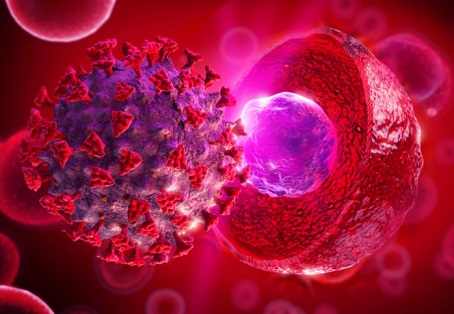Nikhil Prasad Fact checked by:Thailand Medical News Team Nov 05, 2024 1 year, 1 month, 3 weeks, 4 days, 22 hours, 43 minutes ago
Medical News: Researchers Discover New Stem Cell-Based Treatment for Dual Viral Infections
In a new breakthrough, scientists from the University of Tsukuba in Japan have found that extracellular vesicles (EVs) derived from mesenchymal stem cells (MSCs) could help reduce inflammation caused by a co-infection of SARS-CoV-2 and the influenza virus. Such infections, when occurring together, are particularly harmful, causing severe inflammatory responses that worsen lung damage and lead to increased hospitalization and death. This
Medical News report covers the details of this promising approach, which aims to mitigate these inflammatory responses using a naturally derived treatment that harnesses the body’s cellular mechanisms.
 Stem Cell Therapy Promises Relief for COVID-19 And Flu Co-Infection
The Power of Extracellular Vesicles
Stem Cell Therapy Promises Relief for COVID-19 And Flu Co-Infection
The Power of Extracellular Vesicles
The research team focused on EVs, small cell-derived particles containing crucial biomolecules like proteins and RNA. EVs are released by cells, including MSCs, and have a unique ability to regulate inflammation and cell signaling in neighboring cells. In this study, MSC-derived EVs were particularly effective in reducing inflammation caused by both SARS-CoV-2 and influenza A virus (IAV) proteins, which interact with human lung epithelial cells and spark heightened inflammatory responses.
The researchers aimed to understand whether the EVs, particularly those derived from MSCs found in Wharton's jelly (a gelatinous tissue inside the umbilical cord), could help in reducing cytokine levels. Cytokines are molecules that the body releases in response to infection, but excessive cytokine levels, known as a “cytokine storm,” can cause serious complications, including tissue damage and, in severe cases, death. Interestingly, these EVs contain specific molecules, such as miR-146a, that interact with inflammatory signaling pathways to prevent this overreaction.
Examining Lung Cell Reactions to Co-Infection
To test the potential of MSC-derived EVs, the team induced lung epithelial cells with proteins from both SARS-CoV-2 and IAV, recreating conditions of a co-infection. This simulation revealed that both viruses interact in a way that exacerbates inflammation, leading to greater cell damage than either virus alone. The infected cells released high levels of inflammatory cytokines, which, when applied to lung endothelial cells, impaired their natural functions, including their ability to grow new blood vessels, a process known as angiogenesis.
The EV treatment, however, produced promising results. When applied to these co-infected lung cells, the MSC-derived EVs effectively decreased the inflammatory response by transferring miR-146a to the infected cells. This microRNA downregulated specific pathways in the cells, notably the NF-κB pathway, which plays a key role in inflammation regulation. By targeting NF-κB, miR-146a helped to stabilize the function of lung cells and reduce the excessive cytokine levels typically associated with dual viral infections.
Immune
Cell Recruitment and EV Treatment
A significant aspect of this study was the observed effect on immune cell recruitment. Lung cells exposed to SARS-CoV-2 and IAV proteins encouraged the recruitment of immune cells, such as monocytes, macrophages, and neutrophils. These immune cells typically respond to infection by attacking pathogens; however, in cases of over-recruitment, they can contribute to the damaging inflammation observed in co-infections. The MSC-derived EVs reduced this recruitment, which is critical in controlling inflammatory responses in the lungs.
Type 2 Diabetes Complicates MSC Therapy
Interestingly, researchers found that the efficacy of these MSC-derived EVs was affected by Type 2 diabetes mellitus (T2DM). EVs obtained from diabetic MSC donors exhibited reduced levels of miR-146a, weakening their anti-inflammatory effects. When cells from T2DM donors were treated with the co-infection proteins, they displayed an impaired ability to reduce cytokine levels and regulate immune cell activity, highlighting the importance of donor health in determining EV efficacy. This finding underscores the need for further study on optimizing EV treatments for patients with underlying health conditions.
Implications and Future of MSC-Derived EV Therapy
These findings suggest a possible new approach to managing severe viral infections without the use of traditional pharmaceuticals. By harnessing naturally occurring EVs and delivering them as therapeutic agents, scientists hope to create treatments that reduce the risk of overactive immune responses. This MSC-derived EV therapy could eventually serve as a preventive measure or early intervention treatment for patients facing the threat of co-infection, particularly those with higher risks of severe reactions, such as the elderly and individuals with T2DM.
Conclusion
This new research highlights the potential of mesenchymal stem cell-derived EVs as a therapeutic option for managing severe inflammation due to dual SARS-CoV-2 and influenza infections. By reducing cytokine storms and immune cell over-recruitment, this treatment could offer a safer alternative to traditional medications, especially for high-risk individuals. The next steps will involve clinical trials and further investigations to confirm the efficacy and safety of MSC-derived EV therapy.
The study findings were published in the peer-reviewed journal: Scientific Reports.
https://link.springer.com/article/10.1038/s41598-024-77258-0
For the latest COVID-19 News, keep on logging to Thailand
Medical News.
Read Also:
https://www.thailandmedical.news/news/new-insights-from-stem-cell-research-reveals-role-of-inflammation-and-macrophages-in-atrial-fibrillation
https://www.thailandmedical.news/news/singapore-researchers-discover-how-to-activate-dormant-brain-stem-cells-to-treat-neurodevelopmental-disorders
